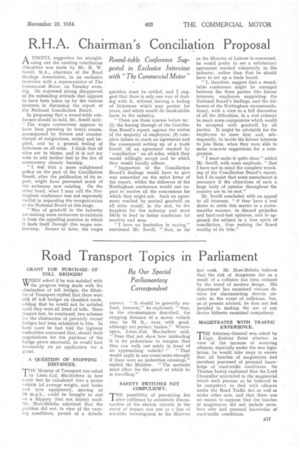Road Transport Topics in Parliament
Page 31

If you've noticed an error in this article please click here to report it so we can fix it.
By Our Special Parliamentary Correspondent
GRANT FOR PURCHASE OF TOLL BRIDGES?
WHEN asked if he was satisfied with the progress being made with the elimination of toll bridges, the Minis1 er of Transport replied that there were still 37 toll bridges on classified roads, adding that he would not be satisfied until they were all freed of tolls.• Since August last, he continued, two schemes for the elimination of privately owned bridges had been submitted to him. In both cases he had told the highway authorities concerned that, should their negotiations for the purchase of the bridge prove successful, he would look favourably on an application for a grant.
A QUESTION OF STOPPING .
DISTANCES.
171-1E Minister of Transport was asked I by Lielit-CoI. MacAndrew in how 1Dany feet he calculated that a motor vehicle (of average weight, and brake andtyre equipment), moving at 20 m.p.h., could be brought to rest en a . slippery (but not frosty) road. Mr. Hore-Belisha admitted that the problem did not, in view of the varying conditions, permit of a definite answer. " It should be generally realized, however," he explained, " that, in the circumstances described, the stopping distance of a motor vehicle may be 75 ft., • even with good, although not perfect, brakes." Whereupon, Lieut.-Col. MacAndrew said, 'Does that not show how misleading it is for pedestrians to imagine that they can walk out safely in front of an approaching vehicle? !"' That would apply ireany event more strongly if there were no pedestrian crossings," replied the Minister. .7 The motorist must allow for the speed at which he is travelling."
SAFETY SWITCHES NOT COMPULSORY.
THE possibility of preventing fire after collisions by automatic disconnection of the electric circuits in the event of impact was put as a line of scientific investigation to the Minister
last week. Mr. Hore-Belisha believes that the risk of dangerous fire as a result of a collision has been reduced by the trend of modern design. His department has examined various devices for disconnecting electric circuits in the event of collisions, but, as at present advised, he does not feel justified in making the use of any device hitherto examined compulsory.
MAGISTRATES WITH TRAFFIC EXPERIENCE.
THE Attorney-General was asked by Capt. Erskine Bolst whether, in view of the increase of motoring offences, especially under the new legislation, he would take steps to ensure that all benches of magistrates had members possessed of personal knowledge of road-traffic conditions. Sir Thomas Inskip explained that the Lord Chancellor appointed to the magisterial bench such persons as he believed to be competent to deal with offences under the Road Traffic Act as well as under other acts, and that there was no reason to suppose that the benches of magistrates did not include members who had personal knowledge of road-traffic conditions.




























































































